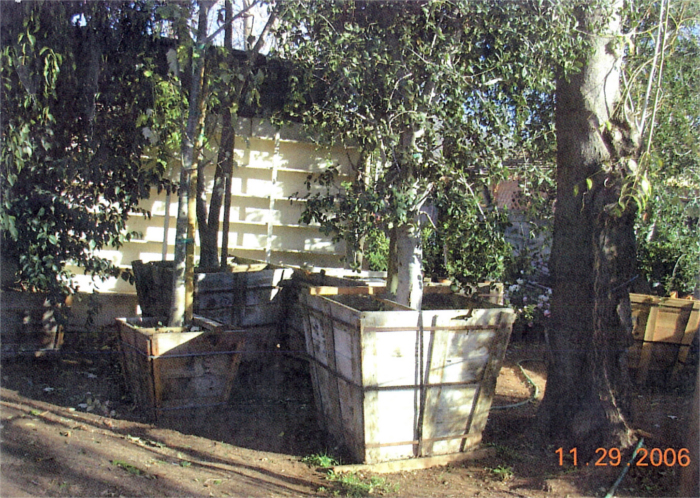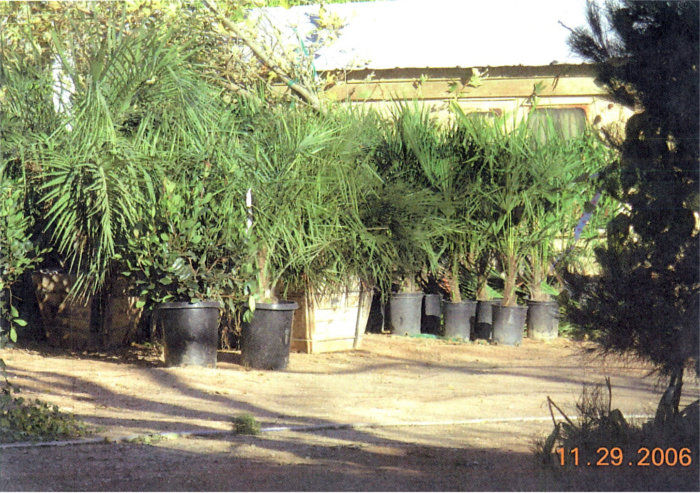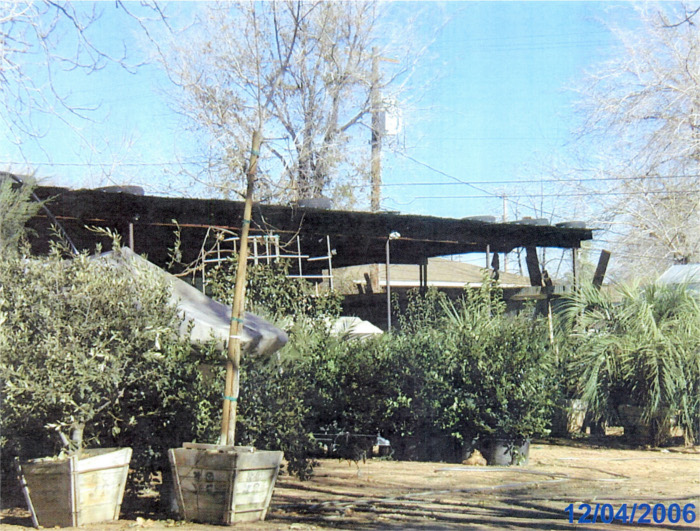Did Councilman Almquist receive special treatment from St. George city employees? Part 1 of a 2-part series.

Written by Michael Flynn
Information obtained by The Independent through a governmental records request has raised questions as to whether St. George City Councilman Gil Almquist and his company, Almquist Landscaping, have benefitted from special treatment from city officials in recent years. This two-part series will explore separate instances in which Almquist may have been granted unusual exceptions to regulations and policies that other citizens are subject to.
This article examines a code enforcement investigation conducted in 2006-07, during which officers discovered that Almquist was using a residential property in downtown St. George to store and water hundreds of trees and plants, along with other materials for his landscaping business, according to a report by code enforcement officers. The investigation into the apparent violation of city zoning and business licensing laws was halted when a senior staff member intervened in the investigation and instructed the code enforcement manager to “let it go.”
“The unlawful activity is therefore legal.”
In November 2006, City of St. George code enforcement officers received a complaint that Almquist, then chairman of the city’s planning commission, was operating a commercial business on a residential property, a lot situated behind two houses on 100 East in downtown St. George. According to the report, “A site inspection shows several hundred potted plants in the rear yard. Landscaping materials stored in the rear yard are in violation of business license conditions.” The report also stated that the materials were “a violation of 10-7 F-2,” the zoning ordinance for a residential area.
(Story continues below)

 Additional images from 2006-07 code enforcement investigation included in the gallery below.
Additional images from 2006-07 code enforcement investigation included in the gallery below.
According to the report, after conducting an initial inspection of the property, code enforcement officers consulted with Bob Nicholson, the city’s community development manager, who told them that he would speak with Almquist about the matter.
A re-inspection scheduled for later that same week never occurred, according to the field reports and accompanying documents. No further action was documented until the complainant contacted the city again, more than two months after the initial complaint was filed. The complainant said that Almquist had since moved even more plants onto the property and was now operating a forklift.
The report stated that code enforcement manager Brad Young then questioned Almquist about the situation. Almquist told Young that he needed a warm place to store and water his plants. When Young asked if it was going to be a long-term arrangement, Almquist replied, “Yes, probably so.”

The code enforcement team again consulted with Nicholson, who visited the site himself. Upon inspection, Nicholson instructed Young to “let it go,” according to the report. Young concluded his field report on the investigation with the statement, “presumably the unlawful activity is therefore legal.”
Young no longer works for the city and could not be reached for comment.


“Frankly, I was very naïve.”
When questioned about the alleged code violations, Almquist initially said that there was never an investigation. He said that a complaint had never been filed, but rather, a neighbor had inquired about activity on the lot.
“Some neighbor thought that there were some apartments going to be built back there,” Almquist said. “It wasn’t a complaint, it was an inquiry as to what was going on back there. All we were doing was hauling off junk and trash and old furniture.”
When asked whether he was storing trees or any other commercial materials on the property in 2006-07, Almquist said that he was not.
After he was informed that The Independent had obtained photographs, reports and other documents from the city that indicated otherwise, Almquist then acknowledged that he had been watering plants on the property; however, he said that at the time, he did not believe he was receiving preferential treatment from code enforcement officers. He said that he could see now that perhaps he had.
“Maybe they did [treat me favorably], but I didn’t ask for that. I didn’t ask them to look the other way, ever,” he said. “And quite frankly, I was very naïve about what the ordinance said.”
At the time of the complaint, Almquist had been a member of the planning commission for nearly 15 years.
Mayor Jon Pike said that, while he agrees it’s possible that Almquist was unclear about the ordinance, he should have been aware that his actions were against regulations. Pike said that, as a planning commissioner, while it’s possible that Almquist helped to write some of the ordinances, including the one he was accused of violating, it’s also possible that he didn’t, in which case Almquist may have been unclear on some aspects of the rule.
“He certainly must have known that it was questionable,” Pike said. “From the pictures, there seemed to be a lot of stuff that you certainly wouldn’t consider to be for his personal use, and I don’t think he would maintain that.”
Pike added that it may, however, be possible that Almquist interpreted Nicholson’s decision to stop the 2006-07 investigation as implicit permission from the city to continue using the lot for commercial purposes.
“Maybe he thought it was a gray area,” Pike said.
When asked if she thought it was possible that a chairman of the planning commission would be unaware that operating a large-scale commercial operation in a residential area was against city regulations, Councilwoman Michele Randall said that it seemed unlikely to her.
”Yes, I think they [the planning commissioners] should know,” Randall said. “I would think that, for instance, Ross Taylor, who is currently chairman of the planning commission – I would think that Ross would know all of the rules for zoning, especially about operating a commercial business in a residential area.”
Almquist said that he doesn’t understand why some people have a problem with the fact that he was using his own lot, which isn’t visible from any street, for his business.
“I was just watering plants,” he said. “I didn’t think that it was a big deal behind my own private property.”
(Story continues below)
 See gallery below for all images from the 2006-07 code enforcement investigation.
See gallery below for all images from the 2006-07 code enforcement investigation.
“It strikes an odd chord with me.”
Zona Jackson, who lives next door to Almquist’s lot, said that the city had denied her request for a business license to operate a small mail-order business selling herbal and nutritional supplements from her house.
“They said it wasn’t zoned for business and turned us down flat,” she said. “It was all by mail. It wasn’t even one [UPS pickup] a day,” she said.
And yet, there are businesses throughout the neighborhood, she said, citing a book store, a music store and other commercial businesses operating just a short distance from her home.
“It strikes an odd chord with me,” Jackson said.
Ed Baca, a retired police detective and former St. George mayoral candidate, said that he wonders why Almquist was allowed to openly violate city ordinances.
”It doesn’t wash,” Baca said of Nicholson’s direction to drop the investigation. “It flies in the face of logic, fairness and justice. Was it just arbitrarily declared by Bob Nicholson who commits a crime and who doesn’t? I’ve never heard of that.”
Baca said he wonders how the city decides when to enforce their ordinances and when to let things slide.
“Does it depend on the color of their skin?” he asked. “Or if they’re male or female? Or does it depend on the fact that he’s a city councilman and has special privileges and gets special compensation? That’s the issue, in my view.”
A new complaint about Almquist’s property surfaced in October 2013. Records indicate that he has been cooperating with code enforcement officers over the past months to get his lot into compliance with city ordinances. The trees and plants have been removed.
However, as of April 2, code enforcement officers still had questions about boxes of rocks, pallets of paver stones, and stacks of empty buckets that Almquist had not yet removed from the lot. He told them that those materials are not used for his business and were present when he purchased the property in 2006.
Although the case is still open and pending investigation, the city has been extending Almquist’s grace period while they work with the councilman. City attorney Shawn Guzman said that any resident who was making an effort to come into compliance would be offered the same courtesy. Almquist has never been issued a notice of violation for his activities on the lot.
The second part of this story explores a land deal between Almquist and the city involving a 3,369-square-foot parcel of city-owned land that was sold to Almquist at the surplus property rate of $1 per square foot. The sale is unusual, not only because the size of the parcel far exceeds the amount of property the city normally sells at a surplus rate, but also because the city accepted, in lieu of money, a trade deal with Almquist for goods and services which, according to documents, may have been rendered months or years prior to the arrangement.
RELATED STORIES:




